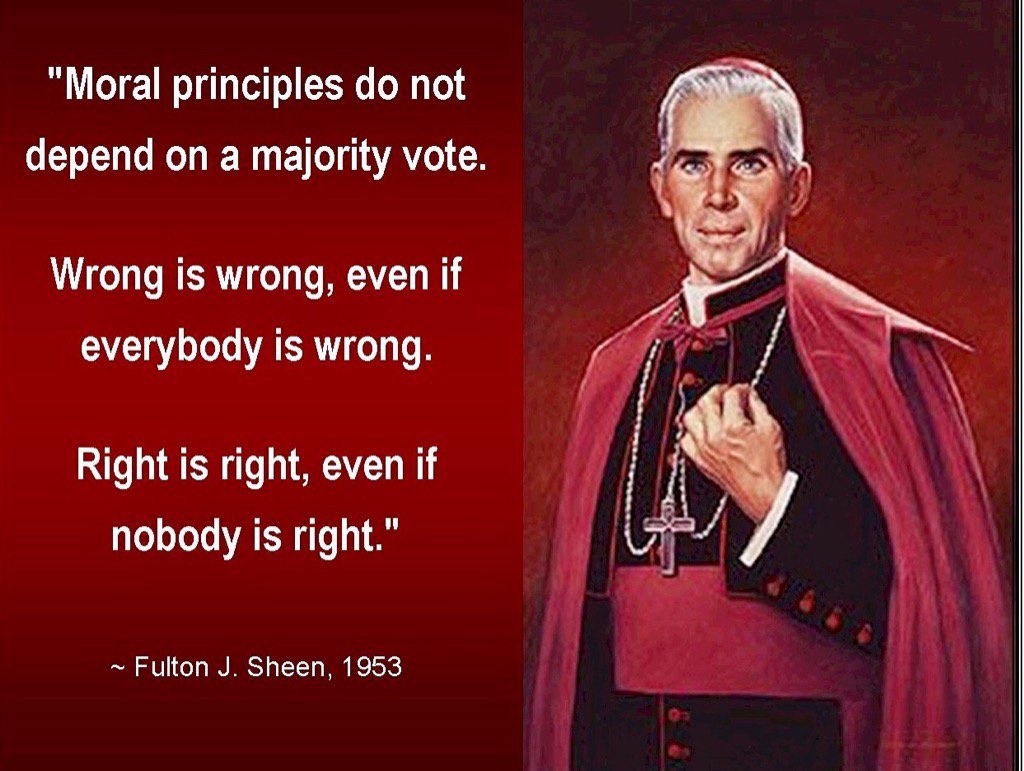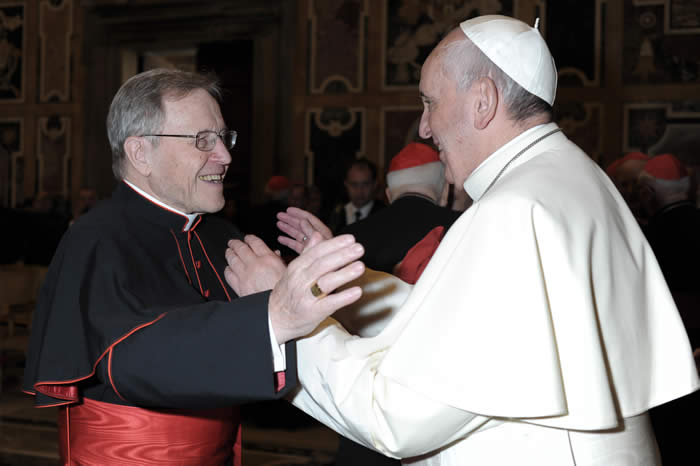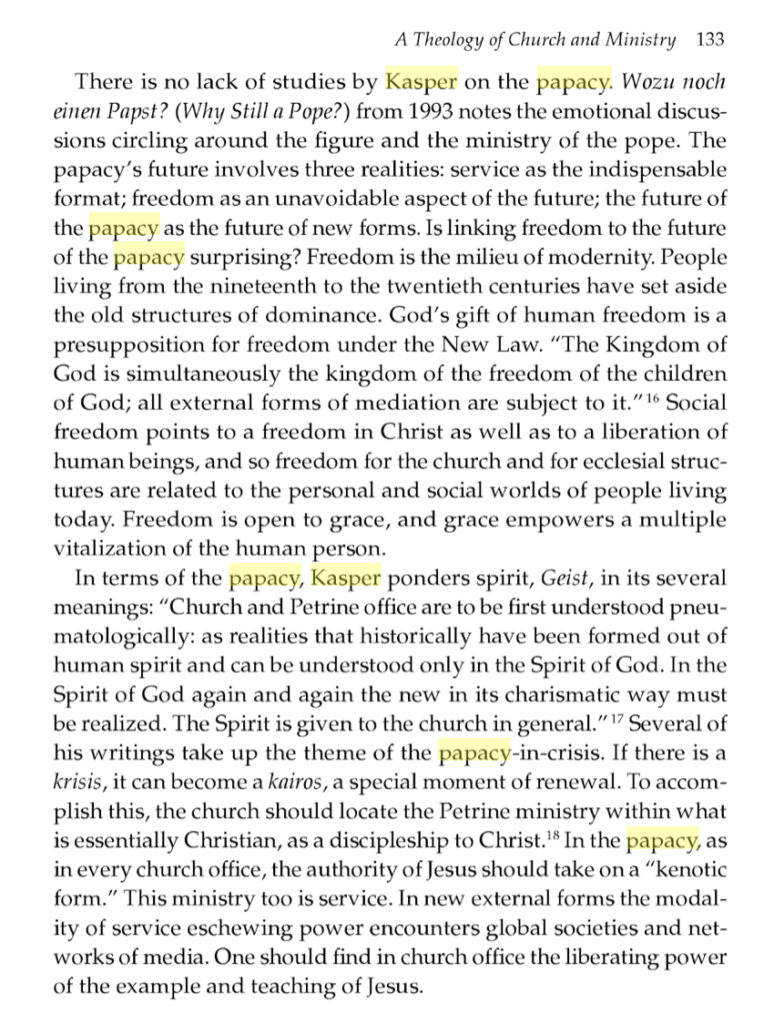“Moral principles do not depend on a majority vote. Wrong is wrong, even if everybody is wrong. Right is right, even if nobody is right.”
-Fulton Sheen



Those enemies most crafty and sly have filled with bitterness and sadness the Church, spouse of the Immaculate Lamb. They have given Her wormwood to drink; they have placed their impious hands over everything that for Her is most dear. Where the Seat of Saint Peter and the Cathedral of the Truth has been erected to be a light for the nations, they have erected the throne of domination of impiety betting that with luck, having struck down the pastor, they can disperse their congregation. Oh invincible champion, help the people of God against the perversity of the spirits that attack them and give them the victory!
Do you know where this quote comes from? This is from the FULL St. Michael prayer composed by Pope Leo XIII after his terrifying locution, hearing satan declare his intent to attack and wipe Holy Mother Church from the face of the earth.
(We laity are supposed to use the shortened version of the St. Michael prayer because the long version is for use in the context of an exorcism, and laypeople must NEVER, EVER, EVER attempt anything even approaching an exorcism. I’m convinced that a lot of the horrific, demonic problems in the black American (rap/hip-hop) culture have their origin in the so-called “black church” with their fake “bishops” and their “exorcisms”, which actually just opened the door to massive demonic oppression – through the so-called black Christian “churches” themselves.
For a priest to attempt an exorcism without specific faculties and permission to do so from his bishop is also extremely dangerous and NEVER to be attempted. EVER. Interestingly, this is how we know that Novus Ordo ordinations and even the most terrible bishops today DO have full Apostolic Succession – there are countless anecdotes of exorcists engaging a demon without having first acquired permission from the bishop, and the demon is totally non-compliant and mocks the priest for having no delegated authority. Once the authority is obtained, even from a terrible bishop, the demons are forced to comply.)
Aside from the obvious prophetic nature – “having struck down the pastor, they can disperse the congregation” – I love how the phrase “betting with luck” is used. Folks, that’s all satan has. Betting that with LUCK his plans will come to fruition. Satan is that weak. He is warring against God Almighty, and when it comes down to it, satan’s entire arsenal consists of the concupiscence of fallen man and – wait for it – LUCK. Luck doesn’t even exist. Everything is in the Divine Providence. Talk about shooting with blanks.
Do you see why Our Lord expects us to have no fear, and to be filled with hope and confidence?
I hope this helps.

Let me once again thank one and all for your continued support and encouragement as we fight for Jesus Christ, His Holy and Indefectible Bride the One, Holy, Catholic and Apostolic Church, and for the Vicar of Christ the Roman Pontiff, and the Petrine See.
To say that the past few days have been momentous would be putting it very, very mildly. While I obviously can’t spill my guts, I do want to give you all HOPE. And boy howdy, can I ever. Folks, keep praying. Our Blessed Lord is up from His little post-prandial snooze in the back of the boat. He’s up. Be filled with hope! Be of good cheer! Be bold in prayer! Remember our team of intercessors, Blessed Emperor Charles I and Zita, St. Vincent Ferrer, St. Catherine of Siena, St. Athanasius, St. Peter, St. Joseph, and Our Lady Undoer of Knots.
If I may ask, would you all join me in prayers of Thanksgiving for graces already received, most particularly those of the past few days? Don’t worry – Our Lord knows EXACTLY what you will be referring to. Just say, “the Ann stuff”. And, it is always good to offer Thanksgiving IN ANTICIPATION for graces that we know will continue to come, because we have FAITH and HOPE. Might I suggest the Glorious Mysteries of the Rosary? The Fruit of the First Glorious Mystery (The Resurrection) is FAITH, and the Fruit of the Second Glorious Mystery (The Ascension) is HOPE. And, of course, the Fruit of the Fifth Glorious Mystery (the Crowning of Our Lady as Queen of Heaven) is TRUST in Mary’s intercession.
Now, back to the business at hand. Have you bought and read J. Michael Miller’s doctoral dissertation, “The Divine Right of the Papacy in Recent Ecumenical Theology” yet? The online version is only NINE BUCKS. What possible, possible reason could there be to NOT engage this veritable Rosetta Stone of a text?
Today, let’s look at Footnote 55 in Chapter 8 on page 184. This is particularly interesting in light of the absolutely bizzarro “Triune Papacy” hypothesis that Ratzinger considered as the opening to his ARSH 1978 essay “Der Primat des Papstes und die Einheit des Gottesvolkes”, (The Primacy of the Pope and the unity of the People of God), which was his contribution to the compendium on the Petrine Office which he, Ratzinger edited, “Dienst an der Einheit.”
I type up the text so that it will populate into search engines, and a photo of the citation is below. Emphases mine.
55. Patrick J. Burns in “Communion, Councils, and Collegiality: Some Catholic Reflections,” in Papal Primacy and the Universal Church, 171, states: “Current historical research on the origins of Roman primacy and episcopal collegiality will inevitable produce more qualified Catholic interpretations of the canons of Vatican I.” Ratzinger takes a somewhat different approach. With the Orthodox, Rome need not demand more than the way papal primacy was understood in the first millenium. The East must cease rejecting as heretical the subsequent Western development and admit that the Catholic Church is legitimate and orthodox under the form it has taken in the Latin West, whereas the West would recognize the Eastern Church as legitimate and orthodox under the form it has taken. In this way the formulations of Pastor Aeternus are bypassed and no longer present a problem. See his, “Prognostics sur l’avenir de l’oecumenisme,” Proche-Orient Chretien 26 (1976) 214-215, or the English summary in T[heological] D[igest] 25 (1977) 202-203. Cf. A[ugustin]. Schmeid’s agreement with Ratzinger in “Das Papsttum im okumenischen Gesprach,” Theologie der Gegenwart 21 (1978) 170.
Ummmmmmm, you think this might merit a look-see? Just a little peek-a-boo, just for giggles? Considering that the standard of schism is, in fact, unity with the Petrine See?
So, I am putting the call out for help on German and French citations, AND if I could ask for any Germans who might have time this week to track down Walter Kasper’s book, “Wozu noch einen Papst?” Folks, that title translates, “Why a Pope?”
Ummmmm, because Jesus Christ said so. But you know that “Wozu…” is going to be the full warplan of Walter Kasper against the Papacy laid out in detail. Again, this MIGHT be something of relevance and importance, considering that Walter Kasper has his hand up his personally installed Antipope puppet’s back and is calling the agenda of the Antichurch, and has been for six years now.
Again, deepest thank to one and all, and keep up the prayers of supplication AND of Thanksgiving!!
As I said in Sunday’s post, the fact that pretty much every other Catholic website or blog is either totally silent or engaging in gaslighting and/or calumny in an effort to sweep the illegitimacy of Pope Benedict’s attempted partial abdication under the rug is telling. “Trad, Inc.” isn’t a very big market, but it IS a market, and I have have heard with my own ears more than one major name in the Tradisphere say, “Francis is great for business! Traffic is up, subscriptions are up, donations are up!”
How strange that they can’t see (or maybe they can) that the whole “ignore it, dismiss it, deny it” tactic is EXACTLY what is being done with regards to the sex abuse stuff. Folks, priests chasing after and molesting lads is considered “no big deal” and “just the way it is” outside of North America. It is very similar to the way Europeans view adultery. The French consider it completely normal and not at all scandalous for a man to have a mistress. Europeans were completely mystified by the whole Clinton-Lewinsky scandal in the late 90’s. To be scandalized by priests and bishops literally raping lads and young men is considered by these “elites” to be proof of unsophistication to the point of stupidity. “Oh, grow up. There will always be queers hanging around sacristies. That’s just how it is….” They think that if they just keep ignoring it and denying it, that the “American hillbillies” will forget about it and move on. There is about as much impetus to purge the priesthood of sodomites as there is to purge the world of ballet of sodomites. That is, ZERO.
And so it is with the Substantially Erroneous failed partial abdication of Pope Benedict XVI. Just ignore it, and it will eventually go away…. Just keep saying, “There is no evidence, no matter what.”
Here’s the thing. There is a veritable MOUNTAIN of evidence. I have been poring over texts, and readers have been sending in citations, and it just keeps going and going. One of the most prolific sources of citations is none other than Cardinal Walter Kasper. Folks, this business of essentially dissolving the Petrine Office has been Kasper’s life’s work. He has been writing about this basically NON-STOP for darn near fifty years.
Looking at the timeline, it has become clear that Cardinal Walter Kasper is at the absolute epicenter of the whole conspiracy to “depose” Pope Benedict (his life-long enemy) and install the puppet Bergoglio.
Walter Kasper is the head of the group called the “Sankt Gallen Mafia” and has been since the death of Cardinal Carlo Martini. Martini died on 31 August, ARSH 2012. Note that date. Martini, like Kasper, was a massive proponent of essentially dissolving the Petrine Office and decentralizing the Church into a loose confederation or “synod” of “bishops conferences”.
Pope Benedict XVI said that he started contemplating his partial attempted abdication “several months” before he announced it. That would put it right after Martini’s death and Kasper’s ascension to the top of the Sankt Gallen Mafia.
The faux-conclave convened in March of ARSH 2013 and Walter Kasper’s lapdog, Bergoglio, was named Antipope. Antipope Bergoglio immediately referred to Kasper as his “favorite theologian” and began implementing Kasper’s evil agenda point for point. Kasper wanted Bergoglio as his puppet front precisely because Bergoglio is an idiot who was and is dependent on Kasper and others to provide him with his talking points. Bergoglio was dismissed after only six months from doing a Ph.D. in Germany in the 1970s because he wasn’t intelligent enough to do the work, and has ever since then been trying to ingratiate himself to and prove himself the equal of the German intellectuals. It’s really quite sad.
I strongly suspect that it was Walter Kasper, who had hated and been the enemy of Joseph Ratzinger since the 1960s, that pressured, coerced, threatened, blackmailed, whatever it was, Pope Benedict XVI to leave in the autumn of ARSH 2012.

“I’m SMART, right Walter?” “Yes Jorge, you are very, very smart.”
Let’s look at some citations. First, let’s look at a chilling citation from Cardinal Joseph Ratzinger’s 1996 book “Salt of the Earth”. The book is written in a question-and-answer interview format with Peter Seewald. Here is page 257. I will transcribe the text so that it populates online in search engines. Emphases mine.
SEEWALD: DO YOU THINK THE PAPACY WILL REMAIN AS IT IS?
RATZINGER: In its core it will remain. In other words, a man is needed to be the successor of Peter and to bear a personal final authority that is supported collegially. Part of Christianity is a personalistic principle; it doesn’t get vaporized into anonymities but presents itself in the person of the priest, of the bishop, and the unity of the universal Church once again has a personal expression. This will remain, the magisterial responsibility for the unity of the Church, her faith, and her morals that was defined by Vatican I and II. Forms of exercise can change, they will certainly change, when hitherto separated communities enter into unity with the Pope. By the way, the present Pope’s [John Paul II] exercise of the pontificate – with the trips around the world – is completely different from that of Pius XII. What concrete variations emerge I neither can nor want to imagine. We can’t foresee now exactly how that will look.
He neither could nor wanted to imagine…. Well, that’s not ominous or anything.
Now let’s turn to Walter Kasper. Let’s start with a paper written in ARSH 2002 by Kilian McDonnell, a Benedictine monk. The title of the 19 page paper is, “WALTER KASPER ON THE THEOLOGY AND THE PRAXIS OF THE BISHOP’S OFFICE” with the introduction stating, “The author reviews the discussion between Kasper and Ratzinger on the ontological priority of the universal Church, and then summarizes several studies by Kasper on the papacy and episcopacy at Vatican I….” Yeah, nothing of any relevance or interest here, right folks?
Let’s go to pages 12 and 13, which are numbered pages 722-723 in the journal:
Kasper does not enter into the long discussion, preconciliar, conciliar, and postconciliar on the importance of involving bishops in the governance of the universal Church. But the discussion is both an inner-Catholic question and an ecumenical imperative. In his encyclical Ut unum sint (no. 96), John Paul II issued a call for practical suggestions on how the Petrine ministry might be exercised. “Such a dialogue,” Kasper suggests, “would make sense only if it led to a new historical formation of the office of Peter. A new form would be similar to that which the office of Peter had in the first thousand years, but in a form appropriate to the differences in historical periods and the relationships of the various churches.”51 This appears to point to an exercise of the Petrine function which is more participatory in style, involving the bishops of the world.
Kasper could call on a number of historical studies to support the con- tention that the Petrine office has historically experienced a number of epochal transformations, and none of its historical forms is identical with the office, including the one that obtains today. “One must indeed say that in the present form of its exercise, the Petrine ministry has far from completely exhausted its ecumenical possibilities.”52 In any new form the essential nature of the Petrine office would have to remain unchanged. But the call for a new form needs to be understood in reference to Kasper’s reading of the development of Catholic ecclesiology, read through the eyes of Vatican I and II. He is obviously convinced that the Catholic sense of the Church demands a strong, even vigorous, papacy. Any new form issuing from Pope John Paul II’s call for help in rethinking the Petrine ministry would not mean a diminished Petrine role, but, on the contrary, as he said in a different context, “an even bigger role.”53 The new expression of the Petrine office would include a significant role for the whole episcopacy in the governance of the Church.
This business of demythologizing, decentralizing and essentially trying to turn the Papacy into a Synod of Bishops has been Kasper’s life’s work. His Sankt Gallen Mafia predecessor, Cardinal Martini, wanted EXACTLY the same thing. Kasper is referred to as a “center-conservative” only because in comparison to monsters like Hans Kung and Johannes Neumann who advocated the TOTAL ABOLITION of the Papacy, Kasper was “conservative” by comparison, and Ratzinger was an arch-conservative… by comparison.
Now let’s go to page 18 of the same paper, and THIS extremely prescient nugget:
But Kasper doubts the necessity, in view of the cultural pluralism in the world, to have pastoral questions determined in all of their details in a binding way by the universal Church, so that factually no room to maneuver remains to the individual bishop as he seeks a pastoral solution appropriate to the specific conditions of his diocese, conditions he alone knows in their particularities. This question comes to mind in view of the document of the CDF “On the Reception of Communion for the Faithful Who Have Divorced and Remarried” (1994),73 as also in the case of the many small determinations of the “Instruction on Some Questions Concerning the Cooperation of Laity in the Ministry of the Priest” (1997),74 even though one agrees with the basic concerns of this instruction.
If there is not a certain flexibility given in the concrete application of the universal discipline, then the individual pastor will not concern himself with the application of universal norms he considers cannot be put into practice; when this happens then one is rightly faced with a pastoral practice out of control. Centralism, in this case, effects exactly the opposite of what is intended and lessens the authority of both pope and the bishops. Then the bishop must helplessly stand by and see the continuation of a “pastoral practice from below,” which is full of problems. The local bishop is hindered in finding appropriate solutions in his diocese on his own pastoral responsibility by his loyalty to Rome and by loyalty to the universal detailed legislation which issues from the Curia. In this perspective, fewer documents and individual instructions from Rome would increase the au- thority of the office of Peter in the really basic issues touching the unity of the Church.75
In concluding, Kasper reflects on the meaning for the pastoral practice of a bishop in a world experiencing two opposing movements. On the one hand, the ecumenical and technological globalization efforts are pushing the world toward the global village. But there is a contrary movement in which all things are being westernized, issuing in a new form of the tradi- tional identities of a plethora of cultures, resulting in a conflict of cultures. The forces impelling toward the unity of the global village are being resisted by the clash of cultures. A peaceful future is only possible when the unity of the multiplicity of cultures is achieved. Such a unity in multiplicity is also of great importance for the Church. When the faith and the essence of the Church is inculturated into the multiplicity of cultures then evangelization is possible. In carrying out the mandate to evangelize in the present situation of unity in the multiplicity of cultures the Church will grapple anew with its own unity in multiplicity.
Now you know why Antipope Bergoglio demands the destruction of Europe and more specifically EUROPEAN CHRISTIAN CULTURE by trafficking in musloid conquerors. Because this has been his master Walter Kasper’s agenda for decades.
Now let us turn to the book “The Theology of Walter Kasper: Speaking Truth in Love” published in ARSH 2014.
What I need is for our German readers to attack “Wozu noch einen Papst?” I mean, the guy wrote an entire book called, “Why is there still a Pope?” Do you think MAYBE there is something of interest and relevance in such a book? And hey, no one else is going to do this, so either we do it, or it doesn’t get done.

“In the papacy, as in every church office, the authority of Jesus should take on a “Kenotic form.”
Kenosis is a Lutheran theology (shocker!) that uses Christ’s self-emptying (Philippians 2:7) to essentially deny the Social Kingship of Christ, and to demythologize at best and outright deny at worst, the Petrine Office. A King without a Kingdom, a Papacy with no authority.
Yep. Walter Kasper, who is a proven liar (remember the Edward Pentin scandal when Kasper denied saying that the African bishops need not be paid any attention, except Pentin had recorded the whole thing on his phone and posted the audio file? Pentin’s career would have been FINISHED had he not been able to rebut Kasper’s filthy lying mouth with the recorded audio. Kasper was perfectly happy not just to lie through his teeth, but to destroy a man’s career, reputation and livelihood in the process) is at the very epicenter of the faux-abdication and subsequent usurpation by Antipope Bergoglio. This whole thing is a Walter Kasper production. Don’tcha think maybe someone should be asking some questions?
Blessed Emperor Karl and Servant of God Zita, pray for us!
St. Vincent Ferrer, pray for us!
St. Catherine of Siena, pray for us!
St. Peter, pray for us!
Lord Jesus Christ, have mercy on us!
In this episode we discuss unsolicited commercial email — spam — before taking off on several semi-related tangents.
Links, reading, and YouTube:
Feedback: please send your questions, comments, and suggestions to [email protected]
The Barnhardt Podcast is produced by SuperNerd Media; if you found this episode to be of value you can share some value to back to SuperNerd at the SuperNerd Media website. You can also follow SuperNerd Media on Twitter.
St. Vincent Ferrer came through. Quickly. Less than 24 hours after my post enjoining his prayers went up, this stupefying citation with translation landed in my email box from the German readership.
Here is the trail of breadcrumbs:
-I posted a screen cap and citation from the opening of Chapter 8 of J. Michael Miller’s doctoral thesis citing Walter Kasper. The quote was, “The present crisis of the papacy is one of legitimation.”
-This quote of Kasper’s was drawn from a work called “Dienst an der Einheit”, page 83.
-“Dienst an der Einheit”, which means, “Service to Unity”, is a collection of papers edited by…wait for it… JOSEPH RATZINGER. So Kasper’s quote was EDITED BY RATZINGER.

Here now blockquoted is the original German and English translation (translated by hand by a fully bilingual German reader – NOT an algorithmic translation) of the opening section of this paper, found on pages 165-167:
Der Primat des Papstes und die Einheit des Gottesvolkes
The Primacy of the Pope and the unity of the People of God.
- I. Der spirituelle Grund von Primat und Kollegialität
(The spiritual basis of primacy and collegiality)Das Thema Papsttum gehört nicht zu den populären Themen der Nachkonzilzeit. Es hatte ein gewisses Maß an Selbstverständlichkeit, solange ihm in politischen Raum die Monarchie entsprach. In dem Augenblick, in dem der monarchische Gedanke praktisch erloschen und durch die demokratische Idee abgelöst ist, fehlt der Primatslehre das Bezugsfeld in unseren allgemeinen Denkvoraussetzungen. So ist es gewiß kein Zufall, daß das Erste Vatikanum von der Primatsidee, das Zweite aber von dem Ringen um den Begriff der Kollegialität beherrscht wurde.
The topic of the papacy is not one of the popular themes of the post-conciliar era. It had a certain measure of implicitness as long as it corresponded to the monarchy in political space. At the present moment, when the idea of monarchy has practically died out and been replaced by the democratic idea, the doctrine of primacy lacks the frame of reference in our general presuppositions. So it is certainly no coincidence that the First Vatican Council was dominated by the primacy idea, but the Second by the struggle for the concept of collegiality.
Dem ist freilich sofort hinzuzufügen, daß das Zweite Vatikanum die Kollegialitätsidee, mit der es Impulse aus dem Lebensgefühl der Gegenwart aufnahm, so zu umschreiben suchte, daß darin der Primatsgedanke enthalten ist. Heute, da wir ein wenig Erfahrung mit der Kollegialität, mit ihrem Wert und auch mit ihren Grenzen gewonnen haben, müssen wir wohl gerade an dieser Stelle wieder ansetzen, um die Zusammengehörigkeit scheinbar gegenläufiger Traditionen besser zu begreifen und so den Reichtum der christlichen Gestalt zu wahren.
It should, however, be immediately added that Vatican II sought to rewrite the idea of collegiality, with which it received incentives from today’s attitude to life, in such a way that it contained the idea of primacy. Today, as we have gained a little experience of collegiality, of its value, and also of its limits, we need to start again at this point in order to better understand the unity of seemingly contradictory traditions, thus preserving the richness of the Christian expression.
1. Kollegialität als Ausdruck der Wir-Struktur des Glaubens
Collegiality as an expression of the we-structure of the faith
In Zusammenhang mit der konziliaren Debatte hatte seinerzeit die Theologie versucht, Kollegialität über das bloß Strukturelle und Funktionale hinaus als Ausdruck eines bis in die innersten Wesensgründe des Christlichen zurückreichenden Grundgesetzes zu erfassen, das sich daher in je verschiedener Weise auf den einzelnen Ebenen der praktischen Verwirklichung des Christlichen darstellt: Es ließ sich zeigen, daß die Wir-Struktur zum Christlichen überhaupt gehört. Der Glaubende steht als solcher nie allein: Gläubigwerden heißt, aus der Isolation heraustreten in das Wir der Kinder Gottes; der Akt der Zuwendung zu dem in Christus offenbaren Gott ist immer auch Zuwendung zu den schon Gerufenen.
In connection with the conciliar debate, theology had tried at that time to grasp collegiality beyond the merely structural and functional, as the expression of a fundamental law reaching back into the innermost essence of the Christian, which therefore presents itself in different ways on the individual levels of the practical realization of the Christian: It could be shown that the we-structure belongs to the Christian in general. The believer, as such, never stands alone: Believing means stepping out of isolation into the We of the children of God; the act of devotion to the God revealed in Christ is always also devotion to those already called.
Der theo-logische Akt ist als solcher immer ein ekklesialer Akt, dem auch eine soziale Struktur eignet. Die Initiation ins Christliche ist daher konkret immer auch Sozialisation in die Gemeinde der Gläubigen hinein, ist Wir-Werdung, die das bloße Ich überschreitet.
As such, the theo-logical act is always an ecclesial act that also lends itself to a social structure. The initiation into the Christian is therefore always concrete socialization in the community of believers, is We-Formation, which is beyond the mere self.
Dem entsprach dann, daß die Jünger-Berufung Jesu sich in der Figur der Zwölf darstellt, die die Chiffre des alten Gottes-Volk-Gedankens aufnimmt, dem ja auch wiederum wesentlich ist, daß Gott eine gemeinsame Geschichte schafft und an seinem Volk als Volk handelt.
This corresponded to the fact that the disciples’ calling by Jesus is represented in the figure of the Twelve, which takes up the cipher of the old conception of God’s people, to whom it is once again essential that God creates a common history and acts on his people as a people.
Nach der anderen Seite zu zeigte sich als der tiefste Grund für diesen Wir-Charakter des Christlichen, daß Gott selbst ein Wir ist: Der Gott, den das christliche Credo bekennt, ist nicht einsames Selbst-denken des Gedankens, ist nicht absolutes und unteilbar in sich geschlossenes Ich, sondern ist Einheit in der trinitarischen Relation des Ich-Du-Wir, so daß das Wir-Sein als die göttliche Grundgestalt allem weltlichen Wir vorangeht und Gottebenbildlichkeit sich von vornherein auf solches Wir-Sein verwiesen findet.
On the other hand, as the deepest reason for this we-character of the Christian, it has become apparent that God Himself is a We: The God, whom the Christian Credo professes, is not solitary self-thinking of thought, is not absolute and indivisible in a self-contained ego, but is unity in the Trinitarian relation of the I-Thou-We, so that We-Being, as the divine basic form, precedes all worldly We’s, and the likeness of God finds itself referenced from the outset to such a We-being.
In diesem Zusammenhang rückte damals ein zuvor weithin vergessener Traktat von E. Peterson über “Monotheismus als politisches Problem” neu in Bewußtsein, in dem Peterson zu zeigen versucht hatte, daß der Arianismus deshalb politische, von den Kaisern begünstigte Theologie war, weil er zur politischem Monarchie die göttliche Entsprechung gewährleistete, während das Obsiegen des trinitarischen Glaubens die politische Theologie zersprengte und Theologie als Rechtfertigung von politischer Monarchie aufhob.
In this context, a previously largely forgotten treatise by E. Peterson on “Monotheism as a Political Problem,” again attracted attention, in which Peterson had attempted to show that Arianism was a political theology favored by the emperors, because it provided the divine equivalent of the political monarchy, whereas the triumph of the Trinitarian faith shattered political theology and overturned theology as a justification for political monarchy.
Peterson hatte seine Darlegung an dieser Stelle abgebrochen; jetzt wurde sie aufgenommen und zu einem neuen Entsprechungsdenken weitergeführt, dessen Grundansatz lautete: Dem Wir Gottes muß kirchliches Handeln im Modell des Wir entsprechen. Dieser allgemeine, vielfältig ausdeutbare Ansatz wurde vereinzelt bis zu der Aussage vorangetrieben, demgemäß folge die Ausübung des Primats durch einen einzigen Menschen, den Papst in Rom, eigentlich einem arianischen Modell.
Peterson had broken off his analysis at this point; now it was taken up and continued into a new analogical thought, the basic idea being that the We of God must correspond to ecclesiastical agency according to the We model. This general, multi-faceted approach has occasionally been advanced to the point that according to it, the exercise of primacy by a single man, the pope in Rome, actually follows an Arian model.
Entsprechend der Dreipersönlichkeit Gottes müsse auch die Kirche durch ein Dreierkollegium geleitet werden, dessen drei Inhaber zusammen der Papst seien. Dabei fehlte es nicht an findigen Spekulationen, die (etwas unter Anlehnung an Solowjews Geschichte vom Antichrist) herausfanden, daß auf diese Weise ein römischer Katholik, ein Orthodoxer und ein Christ aus dem Bereich der reformatorischen Bekenntnisse zusammen die Papst-Troika bilden könnten.
According to the triune nature of God, the church must be led by a triumvirate, whose three occupants together are the pope. It was not lacking in resourceful speculation, which (somewhat following Solovyov’s story of the Antichrist) found that, in this way, a Roman Catholic, an Orthodox and a Christian from the Reformation confessions together could form the Pope-Troika.
Damit schien, unmittelbar aus der Theo-logie, dem Gottesbegriff, die Schlußformel der Ökumene gefunden, die Quadratur des Kreises geleistet, durch die das Papsttum, Hauptärgernis der nicht-katholischen Christenheit, zum definitiven Vehikel für die Einheit aller Christen werdem müßte.*SEE FOOTNOTE
Thus, directly from theology, the concept of God, the complimentary close of ecumenism, seemed to have squared the circle, through which the papacy, the chief annoyance of non-Catholic Christendom, must become the definitive vehicle for the unity of all Christians.
*FOOTNOTE (*(Derlei war gelegentlich in mündlichen Äußerunger zu hören, die sich vergröbernd auf Ausführungen von H. Mühlen beziehen mochten, bes. in dessen Werk Entsakralisierung, Paderborn 1971, 228 ff.; 240 ff.; 376-396; 401-440.Obwohl Mühlens eigene Darlegungen beeindrückend und weiterführend sind, scheinen sie mir von der Gefahr eines neuen Entsprechungsdenkens nicht frei, das die ekklesiologische Anwendbarkeit der trinitarischen Aussage überdehnt.)
*FOOTNOTE (This was occasionally heard in oral remarks, which sought to refer in an unrefined manner to H. Mühlen’s work, especially in his work Entsakralisierung, Paderborn 1971, 228 ff.; 240 ff.; 376-396; 401-440.Although Mühlen’s own expositions are impressive and advanced, they do not seem to me to be free from the danger of a new analogical thought which overstretches the ecclesiological applicability of the trinitarian statement.)
———————————————————-
So, he we have proof of Joseph Ratzinger, like his German and Nouvelle Theologie colleagues and peers of the day, positing RADICALLY SUBSTANTIALLY ERRONEOUS IDEAS about the Petrine Office, casually referring to it as an “annoyance”, and echoing Kasper’s words that the papacy suffered a “crisis of legitimation”. The driving point was that the papacy MUST be “radically and fundamentally transformed” by some sort of expansion into a “collegial, synodal office”. He we see Joseph Ratzinger taking this SUBSTANTIALLY ERRONEOUS MADNESS so far as the say that the Petrine Ministry could eventually include NON-CATHOLICS and thus become the “definitive vehicle for the unity of all Christians.” But first, it has to be “expanded” into a “collegial, synodal ministry”.
Joseph Ratzinger accepted the Papacy in April 2005 AS IT IS, EVER WAS, AND DESPITE HIS WARPED SUBSTANTIAL ERRORS OF WHAT IT MIGHT “BECOME”.
THIS is what Canon 188 was written to protect against. THIS is why the “substantial error” clause is there. So that when this MADNESS was attempted or even approached, that it would FAIL SPECTACULARLY. Why? Because the CHURCH IS INDEFECTIBLE. Because the Petrine Office is SUPERNATURALLY PROTECTED. Because the very act of attempting to execute such madness would nullify the attempt in and of itself, and the situation would just keep reverting to the status quo – the Papacy as established by Christ.
There is absolutely NOTHING that Pope Benedict XVI or anyone else can ever, ever do to successfully effectuate this abject madness described by Ratzinger above or anything remotely related to it, because Canon Law itself is standing like a monolith protecting Holy Mother Church and the Petrine Office from this. They can drive headlong into that monolith as hard as they like, but they will never, ever so much as leave a SCRATCH on Holy Mother Church, Indefectible, nor can they EVER “fundamentally transform” the Petrine Office, Divinely Instrituted by Jesus Christ Himself, and thus IMMUTABLE.
Pope Benedict XVI Ratzinger is the one and only living Pope, whether he likes it or not. The illegitimacy of his attempted “transformation and expansion” of the Papacy in February ARSH 2013 was completely and totally null, and he remains, per Canon 188, the one and only living Pope.
This madness MUST end here, and be resisted with every fiber of our being. Every journalist, blogger, priest and bishop of good will should be bombarded with communiques every day from every mere pew sitter, to DEMAND that the illegitimacy and SUBSTANTIAL ERROR of Pope Benedict’s attempted action in February 2013 be fully exposed and acknowledged, and that Antipope Bergoglio be immediately removed, the Bergoglian Antipapacy totally nullified, and Bergoglio be repatriated to Argentina, hopefully to face civil charges for financial, political and child abuse-enabling crimes.
Pope Benedict XVI Ratzinger should be given either the option to repent and resume his exercise of the Petrine Office, OR be asked to live out his earthly life in prayer and seclusion, with an emergency “state of suspense” regency established to pay the electricity bills and other bare necessities of the Vatican City State. While Popes CAN validly resign, at this point I think that there would be too much suspicion and uncertainty surrounding a resignation now submitted by Pope Benedict, that the path forward IN PRUDENCE is CLEARLY that NO CONCLAVE should be called until Pope Benedict XVI Ratzinger has died, in God’s good time. That just seems like common sense to me. Let there be NO AMBIGUITY NOR CONFUSION.
There will certainly be more to be said about this.
I hope this helps.
St. Vincent Ferrer, pray for us.
St. Catherine of Siena, pray for us.
St. Athanasius, pray for us.
St. Peter, pray for us.
Holy Family, pray for us.
Lord Jesus Christ, have mercy on us.
Yep. The OFFICIAL logo of Antipope Bergoglio’s upcoming pollution of Morocco is a warped Cross INSIDE the crescent moon. And they openly, proudly acknowledge this. No conspiracy THEORIES here, folks. Just Conspiracy Facts.
“Antipope Bergoglio, Vicar of Soros, Servant of Satan.”
Pray for Pope Benedict XVI, and if I may ask, for efforts and initiatives coming to fruition on this end. “Act, and God will act.” No truer words, folks. No truer words. The Tiny Toe…doth wiggle. To-and-fro, to-and-fro….

There is yet another book out about the odious priest Annibale Bugnini, who was essentially the father/architect of the Novus Ordo Mass.
A quote is recounted in the book:
[Alcuin]Reid includes a bit he learned from the late, great Card. Stickler about whether or not Bugnini really was a Freemason, often alleged about him.
“No,” the Cardinal replied, “it was something far worse.”
What could be worse than being a Freemason?
Look at the picture of Bugnini below, and you tell me.

Nah. No red flags there.
Then realize that the vast, vast majority of the priests, bishops and Cardinals today are pinched-lipped faggots that make Bugnini look like Pa Ingalls by comparison.
And further remember that there are two types of faggots: those who have molested boys or lads, and those who haven’t managed it yet, but are working on it.
Ann,
SuperNerd’s comment about how to evangelize really spoke to me and I’ve been meaning to write you about something. I am a TLM attending protestant, technically Methodist, who has been thinking of converting. Actually, I’ve already made my decision, but my spouse is vigorously opposed, so if you can pray for us that might help! (We and Tiny Princess are on it! -AB)
I’m not in the Church at present. I’ve followed you since the Rush Limbaugh on air reading (BTW, I have a suspicion Rush is still following you, too).
I was attending Mass over Christmas and one of the things that is always on my mind was bothering me on this particular night, as well. How in the world am I going to raise my family, if I can ever get them in the Church, in the Traditional Latin Mass? It took me months to figure out what was going on with the Missal, etc. Now I’m pretty comfortable, but I’ve been going to Mass alone so I’ve not had to explain this to my kids (6,4, and 2) and I simply could not imagine how “hard” it’s going to be to raise them in the TLM. We’re used to the ease of protestant church. My spouse thinks I’m nuts.
So, I’m sitting there at Mass and a family comes in. They have enough kids to take up two pews, so they deal with way more hassle than I do with three kids. In one of the pews are their teenage kids who end up sitting behind me. For the entire Mass this 15-16 year old girl sits behind me and sings every prayer, every response, every thing she is supposed to during the entire Mass (in Latin!). She is not a trained singer, but she hits the notes with the choir perfectly and I could not help but think an angel was sitting behind me, helping me along. She has NO IDEA of the evangelization/ministry/answering of prayer she is doing in that moment. None. She is simply “doing what she is supposed to be doing.” I wept. I figure if this kid can sing all the prayers, my kids can, too. When we were walking out of the Church I leaned over and said, “Thank you for your good singing.” This girl was so happy you’d think I was giving her a Grammy award. She literally beamed.
“Doing what you are supposed to do” is ministry. It is evangelization. Everyone thinks they are supposed to be “famous” as in the next Scott Hahn or something.
Yours in Christ,
X
A couple of weeks ago I wrote a piece about the true definition of “schism“, and used the imagery of a monolith as wide as the Milky Way Galaxy, and twice as tall, with each individual human being likened to a single atom. This grossly inadequate metaphor helps to at least give us some way to begin to think about something which we can never fully comprehend: the infinite Triune Godhead.
I came across a video which, given our “monolith” metaphor really struck me, and I hope strikes you too, especially if you feel yourself begin to be dragged down into the hopelessness, defeatism and despair being peddled as virtuousness and “sanity” these days.
Watch the video below about the so-called “Laniakea” galactic supercluster, and then tell me again how a bunch of sodomites, Freemasons and morons are just too much of a match for God, and how there is “nothing we can do”, even though God is on our side. Then, remember well the Canticle of the Blessed Virgin, who carried in her womb the selfsame God that made and sustains the Laniakea galactic supercluster, but who so loves us that He allows us to participate and cooperate in His plans, because that is the only way we can ever be truly happy.
My soul doth magnify the Lord,
And my spirit hath rejoiced in God my Saviour
Because He hath regarded the humility of His handmaid: for behold from henceforth all generations shall call me blessed.
Because He that is mighty hath done great things to me, and holy is His name.
And His mercy is from generation unto generations to them that fear Him.
He hath shewed might in His arm: He hath scattered the proud in the conceit of their heart.
He hath put down the mighty from their seat, and hath exalted the humble.
He hath filled the hungry with good things, and the rich He hath sent empty away.
He hath received Israel His servant, being mindful of His mercy.
As He spoke to our fathers; to Abraham and his seed forever.
Glory be to the Father, and to the Son, and to the Holy Ghost,
As it was in the beginning is now, and ever shall be, world without end. Amen.